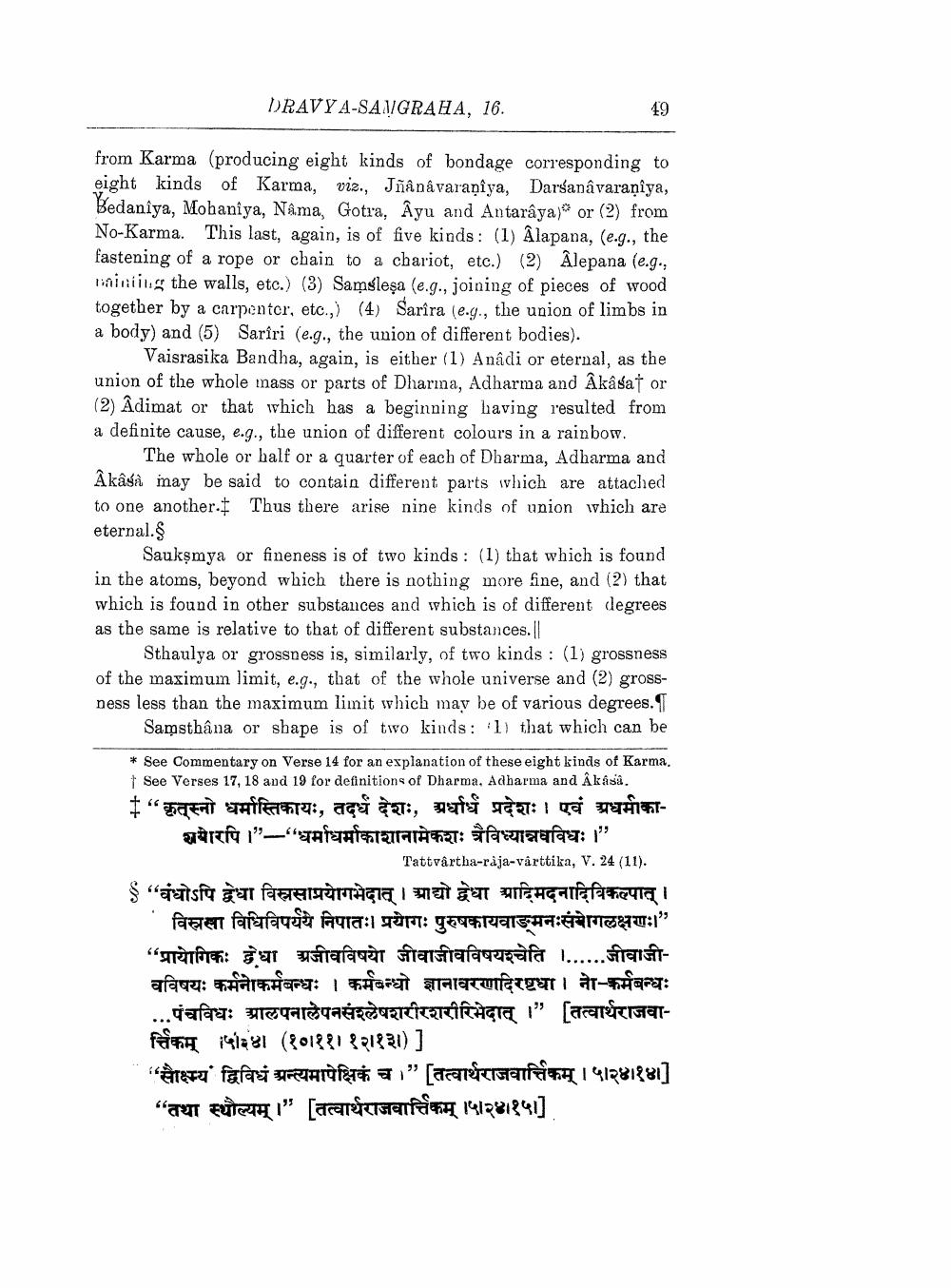________________
DRAVYA-SA/GRAHA, 16.
from Karma (producing eight kinds of bondage corresponding to eight kinds of Karma, viz., Jhanavaraniya, Darsanavaraniya, Bedaniya, Mohaniya, Na.ma, Gotra, Ayu and Antaraya)* or (2) from No-Karma. This last, again, is of five kinds: (1) Âlapana, (e.g., the fastening of a rope or chain to a chariot, etc.) (2) Alepana (e.g., Mainting the walls, etc.) (3) Samslesa (e.g., joining of pieces of wood together by a carpenter, etc.,) (4) Sarîra (e.g., the union of limbs in a body) and (5) Sariri (e.g., the union of different bodies).
Vaisrasika Bandha, again, is either (1) Anâdi or eternal, as the union of the whole mass or parts of Dharına, Adharma and Âkâsat or (2) Âdimat or that which has a beginning having resulted from a definite cause, e.g., the union of different colours in a rainbow.
The whole or balf or a quarter of each of Dharma, Adharma and Âkâså may be said to contain different parts which are attached to one another. Thus there arise nine kinds of union which are eternal.8
Saukṣmya or fineness is of two kinds : (1) that which is found in the atoms, beyond which there is nothing more fine, and (2) that which is found in other substances and which is of different degrees as the same is relative to that of different substances. ||
Sthaulya or grossness is, similarly, of two kinds : (1) grossness of the maximum limit, e.g., that of the whole universe and (2) grossness less than the maximum limit which may be of various degrees. I __Samsthana or shape is of tivo kinds : 1) that which can be
* See Commentary on Verse 14 for an explanation of these eight kinds of Karma, + See Verses 17, 18 and 19 for definitions of Dharma. Adharma and Akasi. + “कृत्स्नो धर्मास्तिकायः, तदर्ध देशः, अर्धाधं प्रदेशः । एवं अधीकाशयोरपि।"-"धर्माधर्माकाशानामेकशः त्रैविध्यान्नवविधः।"
Tattvârtha-raja-várttika, V. 24 (11). $ “बंधोऽपि द्वेधा विस्त्रसाप्रयोगभेदात् । आद्यो द्वधा आदिमदनादिविकल्पात् ।
विस्त्रला विधिविपर्यये निपातः। प्रोगः पुरुषकायवाङ्मनःसंयोगलक्षणः।" "प्रायोगिकः द्वेधा अजीवविषयो जीवाजीवविषयश्चेति ।......जीवाजीवविषयः कर्मनाकर्मबन्धः । कर्मबन्धो ज्ञानावरणदिरष्टधा। नो-कर्मबन्धः
पंचविधः आलपनालेपनसंश्लेषशरीरशरीरिभेदात ।" तित्वार्थराजवार्तिकम् १५२४। (१०।११। १२।१३।)] "सौम्य द्विविधं अन्त्यमापेक्षिकं च।” [तत्वार्थराजवार्तिकम् । ५।२४।१४।] "तथा स्थौल्यम्।" [तत्वार्थराजवार्तिकम् ।५।२४।१५].




